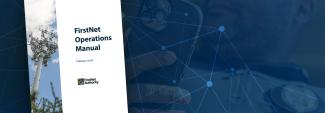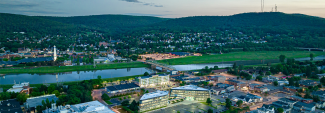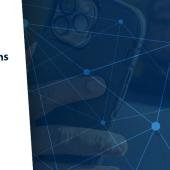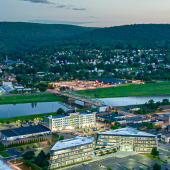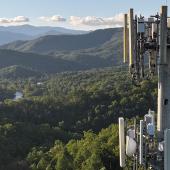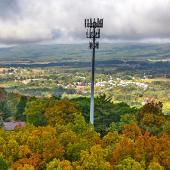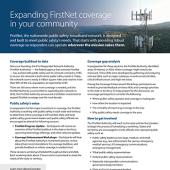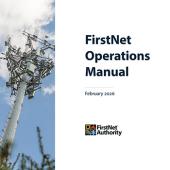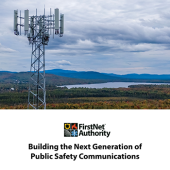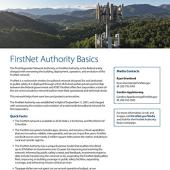This is the latest in a blog series highlighting the associations of the First Responder Network Authority’s (FirstNet Authority’s) Public Safety Advisory Committee (PSAC). PSAC members represent associations and agencies from all public safety disciplines, as well as state, territorial, tribal, and local governments. Together, they provide guidance and recommendations to the FirstNet Authority in carrying out its duties and responsibilities. The PSAC’s input is invaluable to the development of FirstNet, the nationwide broadband network dedicated to public safety.
The National Congress of American Indians (NCAI) represents American Indian and Alaska Native Tribal governments and promotes the broad interests of Tribes and their citizens. NCAI works on behalf of Tribal communities to create economic opportunities and ensure that critical services, such as broadband access and public safety services, are widely available to Tribal citizens.
Since the PSAC was first created, NCAI has served as an active member, providing input on the unique communications challenges Tribal first responders face. Theron Rutyna, Director of Technology for Osni Ponca, of the Ponca Tribe of Nebraska, serves as NCAI’s current representative to the PSAC. In this role, he advocates for Tribal interests, makes recommendations to the FirstNet Authority, and works to ensure FirstNet provides a sustainable and reliable broadband connection to help responders keep Tribal communities safe.
Challenges for Tribal responders
Tribal communities still lag behind the rest of the United States when it comes to accessing critical broadband services. The lack of coverage and telecommunications infrastructure on Tribal lands, which are almost always in rural or remote areas, makes it difficult for Tribes to quickly respond to incidents or coordinate and communicate with others during emergencies. Historical inequities have often left Tribes behind in the rollout of modern technologies, making it difficult for first responders to operate on Tribal lands.
On behalf of NCAI, Rutyna brings these issues to light through his role on the PSAC, advocating for the needs of Tribal responders. Rutyna also serves as Chair of the PSAC’s Tribal Working Group (TWG). Recognizing that Tribal responders face different communications challenges than most first responders, the PSAC established the TWG to discuss Tribal-specific needs. The TWG is comprised of diverse representatives from Tribes, intertribal associations and Tribal government organizations with interests in Tribal public safety. The group provides advice on Tribal consultation, outreach, education, and inclusive engagement strategies in Indian Country.
“The TWG brings the interests of Indian Country and its first responders directly before the FirstNet Authority. Having the direct government-to-government relationship between Tribal organizations and the FirstNet Authority through the TWG shows the FirstNet Authority’s commitment to ensuring that all responders have access to communications in an emergency.”
Bringing broadband to Tribal communities
To help address the lack of broadband access on Tribal lands, NCAI advises the PSAC on communications challenges unique to Tribal communities, ways to engage with Tribal nations, and how to expand telecommunications access for first responders in Indian Country. This feedback has been used to shape the FirstNet Authority Roadmap, the guide to the FirstNet network’s growth and evolution. The Roadmap’s Coverage domain addresses ways to increase access to reliable, consistent coverage and sufficient capacity — both key functions of the network that can fundamentally change how Tribal first responders communicate.
FirstNet is a nationwide network and the FirstNet Authority and its network partner AT&T have made expanding coverage in rural and underserved parts of the country a top priority. In addition to FirstNet’s LTE coverage reaching into all 56 states and territories, the network’s deployable asset program provides portable, extended coverage for use in remote areas in the event of an emergency or in advance of a large planned event. These mobile assets are available at no additional cost to public safety agencies subscribed to FirstNet.
The network also now supports FirstNet MegaRange, a high-power user equipment (HPUE) solution that enables responders to stay better connected at the edge of a cell tower’s range. This helps FirstNet users maximize the coverage from FirstNet’s Band 14 or public safety spectrum.
The FirstNet Authority and the PSAC are committed to advancing innovative solutions, like deployables and HPUE, for Tribal first responders. The PSAC remains dedicated to collaborating with NCAI and working with Tribes to determine communication needs, identify gaps and opportunities, and encourage additional coverage where Tribal responders need it most.
“Enhancing communications for first responders in Indian Country is key to keeping Tribal membership safe. Reservations cover huge areas of the United States in the most remote and rural areas imaginable — from the edge of Chukchi Sea in Alaska, to the high desert of the Navajo, to the wilderness of the Chippewa, to the trackless prairie of the Nez Perce and to all Tribes in the United States. Bringing modern technological innovation to these areas not only provides access but inevitably saves lives. The more rural a first responder gets, the more high-tech they must be to communicate.”
Learn more about NCAI’s initiatives and resources, including toolkits, guides, trainings, webinars, and educational events for Tribal governments and advocates. Follow them on Twitter, Facebook, and Instagram.



